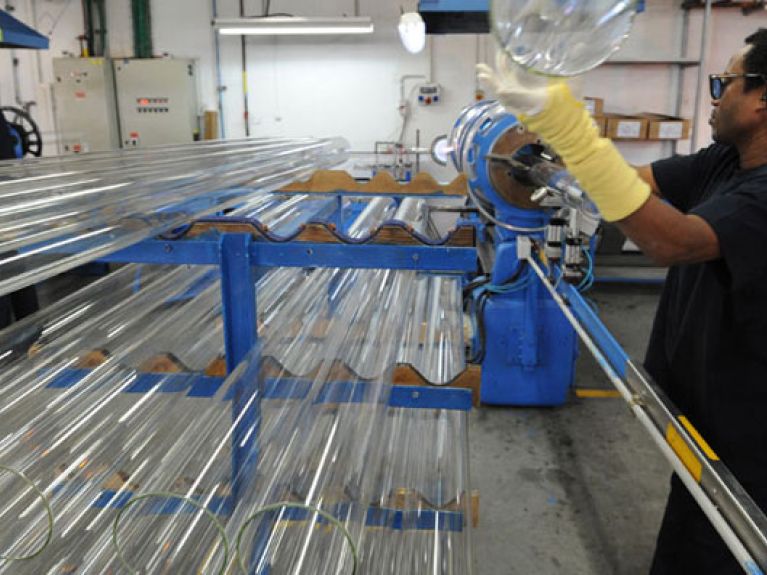Business partners
Biotechnologies, industrial engineering, communication technologies and many other sectors – the economic relationships between Germany and Israel are multifaceted. The volume of trade conducted between the two countries is growing.

The economic relationships between Germany and Israel have developed dynamically over the past 50 years. The volume of German-Israeli trade came to a mere $100 million in 1960. This figure grew to $4.4 billion in 2004 and to $7.4 billion in 2013. This makes Germany Israel's third most important trading partner (after the USA and China). Israel, in turn, is Germany's second most important trading partner in the Near and Middle East.
A closely-woven and extensive network of contacts links the players in each country. Enterprising bilateral chambers of commerce based in Tel Aviv and Frankfurt am Main have been providing since 1968 proactive support to trade and investments. Taking effect in 1995, the Free Trade Agreement concluded between Israel and the European Union (EU) has eased the forging of bilateral business relationships. These bilateral business relationships are, in addition, usually thrusts of the annually-staged German-Israeli governmental consultation. The latest milestone in the improvement of the conditions under which these relationships operate came in August 2014, which is when the revised German-Israeli double taxation agreement was signed. It will take effect on January 1, 2015.
Sensitive inceptions
“Synergy effects arising from the relationships between the high-tech startup scenes in Tel Aviv and Berlin”. Such phrases are the staple of conversations between businesspersons nowadays. Hard to imagine how halting and charged the inceptions of business relationships were. A few years after the Shoah and the end of the Second World War, German companies began doing business with and in Israel. For many of the new country's citizens, the past was still very much with them. They shunned products made in Germany. Facilitating the growth of business ties was the Luxembourg Agreement of 1952, in which Germany committed itself to paying indemnification to Israel. This partially took the form of capital goods. The assembly and maintenance of these machines and other industrial equipment was often handled by German engineers and mechanics. These were thus the German side of some of the first face-to-face contacts between the countries' business communities. In 1960, in a pioneering move, Felix Burian, a Viennese survivor of the Holocaust, opened the first Volkswagen garage in Israel.
The situation is quite different nowadays. Thanks to the great respect accorded in Israel to “products made in Germany”, German companies are sought-after business partners. They thus form often form parts of consortia handling infrastructure projects. Siemens, SAP, Volkswagen, Deutsche Telekom, Bayer, Merck, Henkel and other German companies have invested during the past years more than €100 million in Israel. The close and successful working relationship maintained between Israel and Germany encompasses research and development projects.
Germany: an attractive market
Germany is one of the world's leading exporters. The country sells industrial equipment, vehicles, and metals and related products to Israel. In an interesting development, both Germany and Israel are successful on world markets in many of the same sectors: chemicals, pharmaceuticals, electrical and electronic products, and optronic instruments. Other, fast-growing areas are the biotechnologies, clean tech and ICT (information and communication technologies).
Israel's companies are showing an ever-greater interest in their German counterparts and in their home market. In 2010, Israel's Teva, the world's largest producer of generics, acquired Ratiopharm, its German competitor, in a €3.6 billion move. This was followed by 2012's acquisition of Schiesser, one of the household names in German business, by Delta Galil, an Israel producer of textiles.
The two countries' IT sectors are full of examples of bilateral ventures. Israeli startups benefit from support from Germany's business angels, venture capital companies, and other suppliers of investment funds. German companies, in turn, have awarded a large number of commissions to Israel's IT experts, who are famed for their breadth of expertise and creativity. Telekom Innovation Laboratories (T-Labs) is the name of the central research and development department of Deutsche Telekom. T-Labs cites the above traits as being the reason for its having set up shop in Israel. In 2006, T-Labs forged a working relationship with the Be'ersheba-based Ben Gurion University. In 2013, the city and the university launched the Advanced Technology Park. It is located in Be'resheba, which is in the Negev. The center serves to further the intermeshing of the research being conducted by the university with that being undertaken by locally-based companies. SAP is the world's leading supplier of corporate software. It is based in Walldorf, Germany. Israel is one of the main venues of SAP's research. This is undertaken by SAP Labs Israel Ltd. Based in Ra'anana, the research center is one of the largest in the world for the SAP group.
Israel and Germany have set themselves the objections of strengthening and extending the working relationships among the countries' SMEs (small and medium-sized enterprises). Planned are the making of investments and the pursuit of joint projects in the areas of energy efficiency, environmental technologies and the biosciences. Also targeted is the supporting of research and development. This support is governed by a number of bilateral agreements. They cover the mechanisms for the making of these important investments in the future. Encompassed in this is vocational training.